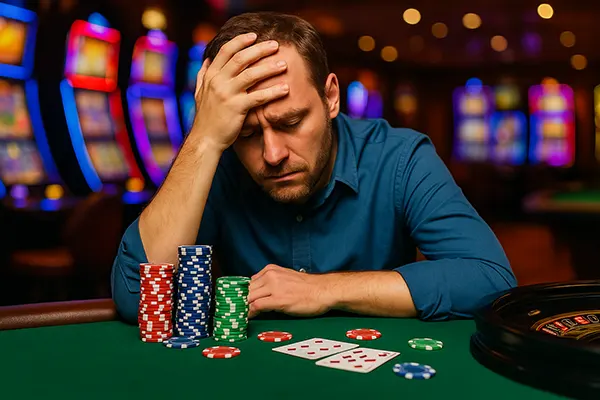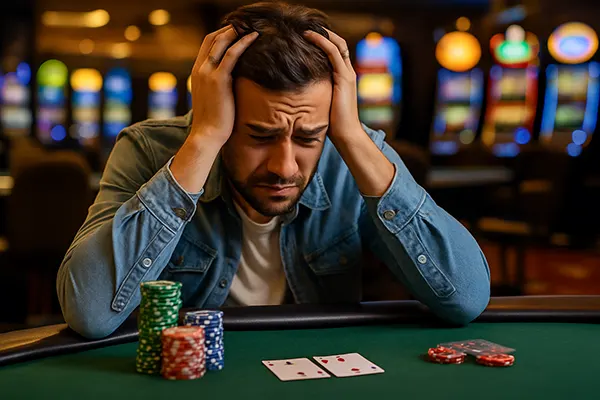
Every gambler, at some point, has asked the same question: why do I keep losing in the long run? This article takes a deep dive into the psychological traps and behavioural biases that drive players into a losing streak over time. While luck plays a role in the short term, the real reasons behind long-term losses are deeply rooted in human psychology, cognitive distortions, and flawed decision-making processes.
One of the most common behavioural pitfalls is the illusion of control — the belief that skill or strategy can influence the outcome of inherently random events. This is particularly prevalent in games of chance, where players convince themselves they have mastered a pattern or system that doesn’t actually exist. In reality, the outcomes are statistically independent and governed by probability, not human input.
Closely related is the gambler’s fallacy, the flawed assumption that past results influence future outcomes. Players believe that after a long series of losses, a win is “due”, which leads them to continue betting, often increasing their stakes irrationally. This cognitive bias can be financially destructive, especially when players fail to recognise randomness in short-term variance.
Over time, both the illusion of control and the gambler’s fallacy feed into escalating losses. A player might feel compelled to keep playing in the belief that persistence will eventually be rewarded. But this misjudgement only reinforces the cycle of loss and disappointment.
When players operate under the illusion of control, they tend to overestimate their chances of success. This often results in riskier betting patterns and a reduced ability to walk away. Rather than adjusting strategy based on rational analysis, they rely on superstition or “lucky streaks”.
The gambler’s fallacy distorts decision-making by treating each bet as a potential correction for previous outcomes. This leads to the Martingale mindset, where doubling bets after each loss seems logical — until an extended losing streak results in catastrophic losses.
Ultimately, these psychological traps prevent players from applying sound money management and realistic expectations. They are unable to view gambling as a form of entertainment with a cost, rather than a profit-generating pursuit.
Another behavioural trap is loss-chasing, where players attempt to recover past losses by increasing the size or frequency of their bets. This strategy is driven not by logic, but by emotion — mainly frustration, anger, or desperation. In most cases, it leads to deeper financial trouble and psychological distress.
Emotions play a major role in long-term losses. While small wins provide a temporary high, losses often trigger more aggressive behaviour. As stress levels rise, judgement becomes clouded, leading to reckless choices and poor bankroll management.
Moreover, emotional volatility reduces the ability to stick to pre-set limits. Players may abandon their original budget, continue playing beyond exhaustion, and make increasingly irrational choices in an effort to turn things around. This loss of control is a hallmark of problem gambling.
Loss-chasing creates a cycle where the fear of regret over past decisions fuels even more risky behaviour. Instead of accepting a loss and walking away, players view it as a challenge to be overcome. This mindset rarely ends well and often results in larger debts or personal issues.
The emotional attachment to “breaking even” prevents players from recognising the long-term edge is not in their favour. Chasing losses turns gambling from entertainment into a compulsion. What begins as a few emotional decisions may spiral into long-term harm.
By failing to detach emotionally from their play, gamblers expose themselves to repeated disappointment and an unhealthy relationship with risk. Responsible gambling involves acceptance — something loss-chasers typically reject.

Variance — the statistical ups and downs of outcomes — is often misunderstood by players. They might attribute a short winning streak to skill, reinforcing overconfidence and pushing them into higher-stakes situations. However, overconfidence can be a silent killer in gambling behaviour.
When players win, they often believe they have found a “system” or have acquired superior insight. This belief inflates their confidence unjustifiably, especially in games where outcomes are random and independent. The temporary success becomes a trap rather than a signal to withdraw.
On the flip side, when variance swings the other way, these same players struggle to accept the randomness. Their overconfidence doesn’t allow for downswings, making losses feel more personal and unjust, thus intensifying emotional reactions and irrational play.
Overconfident players are more likely to take larger risks, ignore limits, and engage in unsafe strategies. They feel immune to loss, assuming their “skills” or “methods” will eventually prevail. This mindset blinds them to objective reality and odds.
Even in games where strategy matters — such as poker — overconfidence can be dangerous. It can cause players to deviate from optimal play, underestimate opponents, or dismiss variance as bad luck rather than part of the game’s fabric.
To combat this, players need humility and discipline. Acknowledging the role of chance, embracing variance, and maintaining realistic expectations are essential for avoiding long-term behavioural traps.